Taiwan Furnishing Makers Go Green
2010/01/05 | By Judy Li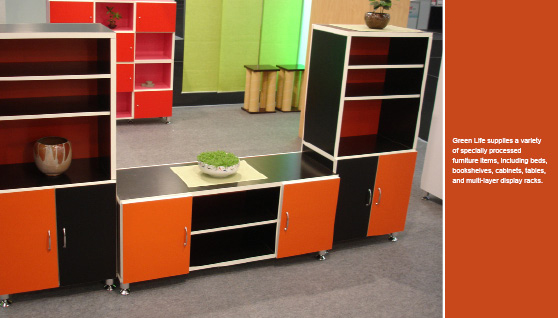
The obvious manifestations of a world sickened by human abuse have awakened a global environmental protection movement that is also stirring in Taiwan's furnishing industry. In growing numbers, manufacturers are turning out eco-friendly products that can be either recyclable or easily biodegraded into the soil. In the process, they are also attracting eco-sensitive consumers.
Processed paper, fiber, wood, and other natural materials are gaining popularity in the furniture sector's new green brigade. Apart from their eco-cred, these products are also winning over customers at home and abroad for their innovative designs.
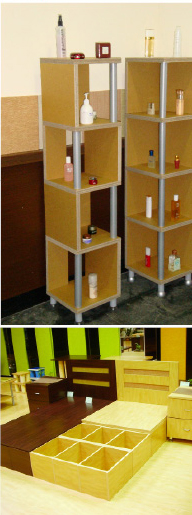
Living Green
As its name implies, Green Life Paper Furniture Co. has always focused on environmentally-friendly products. During its nearly 35 years of doing business, the company has made corrugated paper cartons for food companies, such as Weichuan, Taisun, Vedan, Weilih, etc.," recalls Kuo Hsin-chih, chairman of the company. The company also uses specially processed paper in its furniture and building materials.
As food companies moved overseas, carton demand in Taiwan plunged, forcing Green Life to diversify into new markets. In 1995, the company introduced its innovative Beili green fiberboard pallets for Taiwan's then-booming information technology (IT) and telecom industries. Kuo says the pallets have weight capacities endure of 100 to 1,000 kilograms, and are used by many of the big names in the IT and telecom sector, like Acer, Chi Mei Optoelectronics, Quanta, Liteon, D-Link, Wintek, and ProMos, etc. Hitachi, Canon, Ricoh, Sharp, Sony, TDK, Yamaha and other top-shelf Japanese brands are also among Green Life's buyers, Kuo says.
It wasn't until 2006 that Green Life expanded into furniture production made with 100% recycled paper. "We produce top-quality products and have spent a lot of time and money to develop the advanced manufacturing technology needed to make high-end paper furniture," Kuo says. "We now supply a series of green furniture items including tables, computer desks, chairs, cabinets, TV stands, bookshelves, and jewel boxes, as well as curtain series."
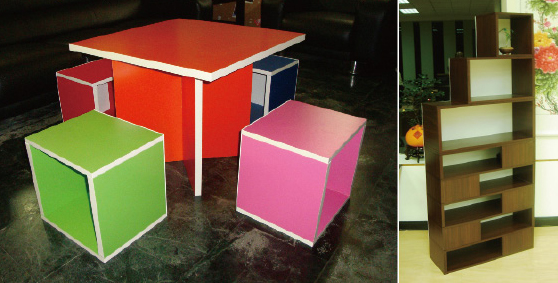
All of these furniture products meet the EU's SGS test to assure that they are non-toxic and free of formaldehyde. The company emphasizes that its “green” furniture products are natural, environmentally friendly, and health-oriented, while being attractive, easy to assemble (no nails required), and waterproof as well.
"Most of our furniture products and curtains are made from paper or fiber materials that can be flexibly designed, combined, and painted. With special treatment, such furniture can be painted or printed with almost any kind of pattern and in any color. They are also almost as good as wood items in terms of endurance and load bearing, yet lighter in weight," Kuo points out.
"Our revolutionary eco-modular furniture is solid, stable and strong and easy to assemble (no tools required). The furniture is constructed with 99% recycled paper and comes in limitless configurations," he emphasizes.
Today the company has a workforce of around 60 persons generating mainly paper furniture and paper pallets, with the former accounting for 35% of the total output and the latter making up the remaining 65%. Kuo believes that the ratio of paper furniture will expand in the near future.
Green Life sells its products to both the domestic and overseas markets and has a sole agent in the United States in charge of the markets in North America and Central & South America.
Eco-friendly Film
With more than four decades of experience in the printing industry, M.S. Printing Co. has developed into a prestigious supplier of furniture finishing products including printed paper with NC/AMC/PU coating, printed PVC film with UV coating, printed melamine sheet, self-adhesive film as well as edge banding.
To catch up with the world's environmental protection trend, the company has in recent years developed wood grain PETG film to substitute PVC film. "PETG is a transparent thermoplastic sheet material with outstanding thermoformability and good impact resistance," says Chang Ya-yun, chairperson of the company. "PETG is an excellent choice for applications that require durability, deep draw thermoforming and clarity."
The company's products can be used for flat surface lamination, curved surface lamination, vacuum foaming (membrane press), wrapping, and high-pressure lamination. They are also suitable for metallic and wooden panel lamination and for surface lamination of various furniture items.
"Actually our products are mostly sold to furniture manufacturers both at home and abroad. To lower manufacturing costs, Taiwan's furniture makers have been moving to China since the early 1980s. So we moved some of our production lines to China in 1986. Now we have two plants in Guangdong Province, with a combined workforce of more than 170 persons; while our plant in Taiwan has some 40 workers," Chang says.
"We provide half of the products turned out in China to the local market there and the remaining half are exported. As for the products generated in Taiwan, 40% are sold abroad and 60% are marketed on the island," Chang indicates. "Our overseas clients are mostly furniture makers in Southeast Asian countries, including Malaysia, the Philippines and Vietnam. We also sell our products to markets as far away as South America."
To guarantee quality, M.S. Printing purchases most of its chemical materials from Nan Ya Plastic Corp., one of Taiwan's leading plastic manufacturers; and imports some high-end raw materials, such as color power and specialty chemicals, from Europe. "Our products have been certified by SGS for quality and eco-friendliness," Chang notes.
Chang says that the company has struggled over the last couple years as costlier raw petrochemical materials, such as PVC and PU, increase manufacturing costs. "Our manufacturing costs have risen by 20 to 30% because of raw material prices, and we have to absorb these costs instead of passing them onto our clients," Chang says.
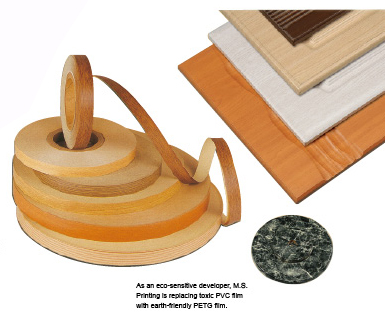
To be more eco-sensitive, M.S. Printing has devoted more efforts to using eco-friendly materials and new technologies to turn out products that meet world standards. The company has in recent years gradually replaced PVC with PETG as the main material in its products, since the former contains a higher amount of chemical toxins, such as dioxin, while the latter is free of toxic chemicals and meets the EU's RoHS standard. "The price of PETG is almost double that of PVC, but we still plan to replace PVC with PETG in the future. We have committed ourselves to protecting the earth by making environmentally-friendly products," Chang affirms.
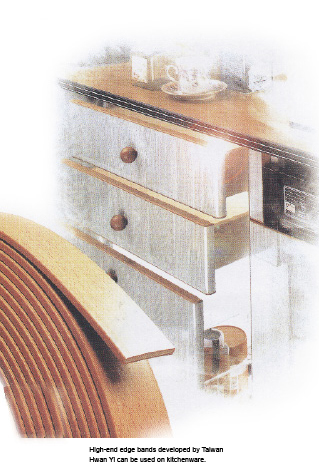
Earth-friendly Furniture Parts
Taiwan Hwan Yi Industries Co. is another green-oriented manufacturer, specializing in decorative parts and finishing materials for furniture and household items.
Established in 1981, the company initially concentrated on the production of plastic and aluminum trims for electronic products. Later it added machine tools to turn out polyvinyl chloride (PVC) trims for computer desks, coffee tables, cabinets and corner posts.
Currently the company's products come in five categories, including PVC edging, finished doors, wall seal profiles, aluminum profiles, roller-shutter slats, and T-shaped profiles; baseboard, ceiling profiles, and decorative trims; picture frames; windshield molding; and bicycle fenders and mudguards.
The T-shaped profiles can be installed on office furniture, bedroom furniture, and dining tables, especially PC desks, conference tables, and dining room accessories. Melamine resin-impregnated decorative paper and medium density fiberboard are imported from Germany to ensure the high quality of these products.
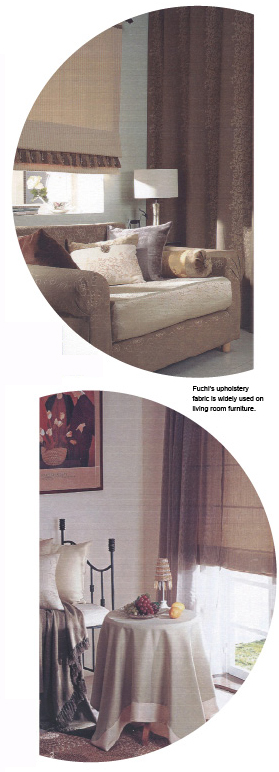
"Our products are versatile, suitable for furniture as well as automobiles," says Chiu Cho-ten, president of the company. "For instance, our extruded edging, available in thickness of 0.45-6 mm and width of 12-44 mm, can be used on wooden knockdown furniture, kitchenware, OA furniture, advertising signs and decorative strip."
"Our products are durable and available in various colors," Chiu emphasizes. "We fill OEM orders and accept special orders for total solutions. We also have our own well-known brand—Lite Max."
Green Upholstery
Established in 1963 as a garment producer, Fuchi Interior Co. is an experienced upholstery manufacturer and weathered many difficult periods. Today the company is one of the leading upholstery makers in both Taiwan and China.
Fuchi diversified into the upholstery and interior decoration segment in 1973. Later in 1970s and early 1980s the company grew rapidly along with the thriving furniture industry in Taiwan and established a separate upholstery department in 1982 to handle growing demand.
To improve the quality of its products, Fuchi introduced advanced textile manufacturing technology from Kawashima Textiles of Japan and imported sophisticated machinery as well. With help from Kawashima, the company has rolled out a steady stream of innovative high-end fabrics that have gained popularity among furniture manufacturers and interior designers.
"After more than four decades, Fuchi remains a formidable player in the industry," notes Jiin Tsai, vice general manager of the company. "The trick to survival in this business is to keep turning out innovative products and stay ahead of copycats, because they are everywhere, particularly in under-developed and developing countries."
In 1992, Fuchi opened a plant in Qingdao, Shandong Province. Three years later, it opened a second manufacturing plant in Changchun, Jilin Province. In 2002, it set up a leather cutting plant in Shanghai.
"We sell upholstery products mainly to domestic furniture makers. Most of them have gone to China, so we have followed them across the Taiwan Strait," Tsai says. "The lower manufacturing costs were another incentive to move the bulk of our production to China. Today, our operations in Taiwan largely focus on marketing, R&D and some high-end production lines."
Fuchi has around 200 employees in Taiwan, with more than one tenth of them working in R&D. "Our market focus for years was Taiwan and later China," Tsai says. "We began exploring other markets in the late 1990s and established a company in Malaysia in 1998. In 2005, we opened a plant in Thailand to turn out fabrics and leather for vehicle seat covers."
"The market trend for upholstery products changes very fast," Tsai adds. "Usually the life cycle of an upholstery pattern is only one or two years. So, manufacturers in this industry have to be sensitive and efficient enough to meet changing fashion trends. Our strong R&D team and highly efficient plants enable us to adapt quickly to the market trends."
As the world turns green, Fuchi is also ramping up production of eco-friendly fabrics that can be recycled and are environmentally benign. It's not easy to keep up with global trends, but we do our best," notes Tsai. "It used to take at least two years to develop a new kind of fabric. Today we can do it in one year."
Today Fuchi offers more than 900 patterns of upholstery fabrics. Among its more popular lines are jacquard, sheer, blinder, and velvet fabrics. "In addition to the texture and quality, we also emphasize the functions of our fabrics," Tsai reports. "We have developed special fabrics that are flame retardant, dust-proof, quick-dry, and can block ultraviolet rays."
By focusing on operational efficiency and constantly incorporating advanced manufacturing technologies, Fuchi has achieved steady growth and stayed at the forefront of the industry.

